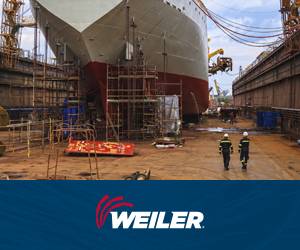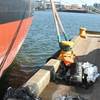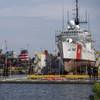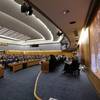February 26, 1999
EPA is proposing an emission control program for new compression-ignition marine engines rated at or above 37 kW. The affected engines are used for propulsion and auxiliary purposes in a wide variety of marine applications. The standards proposed for these engines would require substantial reductions in oxides of nitrogen and particulate matter emissions to correspond with the next round of emission standards for comparable land-based engines.
The proposed standards are expected to provide a significant reduction in oxides of nitrogen and particulate matter from emissions from this source. When combined with other mobile source emission control programs, the program will help provide long-term improvements in air quality in many port cities and other coastal areas.
Overall the proposed program would provide much-needed assistance to states facing ozone and particulate air quality problems, which can cause a range of adverse health effects for their citizens, especially in terms of respiratory impairment and related illnesses.
63 FR December 11, 1998, p. 68508.
March 1, 1999
The USCG is reopening the comment period for the notice of proposed rulemaking for Handling of Class I (Explosive) Materials or Other Dangerous Cargoes Within or Contiguous to Waterfront Facilities to allow additional time for public comment.
64 FR January 12, 1999, (USCG-1998-4302) p. 1770.
March 1, 1999
The USCG is proposing to revise the Regulated Navigation Area (RNA) to include the Kill Van Kull Channel, Newark Bay Channel, South Elizabeth Channel, Elizabeth Channel, Port Newark Channel, and New Jersey Pierhead Channel, New York and New Jersey. This action is necessary because of the extensive channel deepening project being undertaken jointly by the USACE and the Port Authority of New York and New Jersey. The RNA is needed to ensure the safety of vessels transiting the restricted channel during blasting and dredging operations.
63 FR December 31, 1998, (CGD01-98-165) p. 72219.
March 1, 1999
The USCG, after consultation with the Department of Justice, Department of Interior and the Department of Commerce, is establishing a permanent Regulated Navigation Area (RNA) along the northwest Washington coast and in a portion of the entrance of the Strait of Juan de Fuca. The RNA will reduce the danger to life and property in the vicinity of Makah whale hunt activities. Within the RNA, a Moving Exclusionary Zone around a Makah whale hunt vessel will be in effect during actual whale hunt operations.
63 FR October 1, 1998, (CGD 13-98-023) p. 52603.
March 4, 1999
The USCG is extending the comment period for the notice of proposed rulemaking of Limited Service Domestic Voyage Load Lines for River Barges on Lake Michigan to allow additional time for public comment.
63 FR December 28, 1998, (USCG-1998-4623) p. 71411.
March 30, 1999
This USCG interim rule implements measures for maintaining or regaining control of a tank barge that will reduce the likelihood of a tank barge's grounding and spilling its cargo. These measures are necessary because without them a tug that loses its tow lacks ready means for regaining control of it.
63 FR December 30, 1998, (USCG 1998-4443) p. 71754.
Final Rules
February 22, 1999
The USCG is revising Table 1, its list of annual marine events that occur within the Eighth USCG District. This action is being taken to ensure the safety of life and property during each event, while avoiding the necessity of publishing a separate temporary regulation each year for each event. Table 1 reflects the approximate dates and locations of each annual recurring marine event.
63 FR December 22, 1998, (CGD 08-98-018) p. 70653.
Notices
February 28, 1999
The USCG is requesting comments on potential cargo securing standards for vessels operating in U.S. waters carrying general cargo and hazardous materials while engaged in international and U.S. domestic coastwise trade. Potential standards would reduce the risk of serious injury or death, vessel loss, property damage and environmental damage caused by improperly secured cargo aboard a vessel.
64 FR January 11, 1999, (USCG-1998-4951) p. 1648.
February 28, 1999
The USCG is seeking applications for appointment to membership on the Navigation Safety Advisory Council (NAVSAC). NAVSAC provides advice and makes recommendations to the USCG on matters relating to the prevention of vessel collisions, rammings, and groundings.
64 FR January 5, 1999, (USCG-1998-4920) p. 562.
March 1, 1999
The USCG's National Maritime Center is extending the comment period on the issue of Mariner Licensing and Documentation. The original public notice, published September 21, 1998, requested comments on the feasibility of privatizing examinations for mariner licenses and merchant mariner documents in the USCG's Mariner Licensing and Documentation program.
64 FR January 11, 1999, (USCG-1998-4448) p. 1646.
March 4, 1999
The USCG requests comments on possible actions and control measures to minimize the occurrence and effect of potential Year 2000 (Y2)-related equipment and system malfunctions aboard vessels, at port facilities, and at Marine Terminals. Malfunctions and failure of date sensitive automation and computer processes can potentially halt critical domestic and international maritime operations. Possible measures to address this risk include rigorous equipment and certification, and closing or restricting access to U.S. ports.
63 FR December 4, 1998, (USCG-1998-4819) p. 67166.
March 5, 1999
In accordance with the Paperwork Reduction Act of 1995, this notice announces Maratime Administration's intentions to request extension of approval for three years of a currently approved information collection entitled "Uniform Financial Reporting Requirements".
64 January 4, 1999, p. 203.
April 19, 1999
The USCG requests comments on the impact of their regulation on small entities. As required by the Regulatory Flexibility Act and as published in the Department of Transportation's Semi-Annual Regulatory Agenda, the USCG is analyzing its first group of regulations during fiscal year 1999 to identify rules which may have a significant economic impact on a substantial number of small entities. At the end of the analysis a list of those regulations that may have a significant economic impact on a substantial number of small entities will be published seeking public comment on how the burden on small entities can be reduced.
64 FR January 19, 1999, (USCG-1999-4975) p. 2868.
April 20, 1999
The USCG is conducting a study of port-access routes to evaluate the continued applicability of and the need for modifications to current vessel routing measures in and around the Strait of Juan de Fuca and adjacent waters, including Admiralty Inlet, Rosario Strait, Haro Strait, Boundary Pass and the Strait of Georgia. The goal of the study is to help reduce the risk of marine casualties and increase vessel traffic management efficiency in the study area. The USCGseeks comments on the issues raised and questions listed in this notice.
64 FR January 20, 1998, (USCG-1999-4974) p. 3145.
Editor's Note: This information is courtesy of the Transportation Institute On-Line, located at http://www.trans-inst.org/
Sponsored Content
Protect Your Crew. Exceed Weld Standards.

MSC Sets a New Standard for Time Off in 2025, Plus Earn a $44,345 Bonus as an Able Seaman!

August 2025
 Read the Magazine
Read the Magazine

 Read the Magazine
Read the Magazine
This issue sponsored by:

Rethinking Crew Experience: The Next Frontier in Maritime Operations
Subscribe for
Maritime Reporter E-News
Maritime Reporter E-News is the maritime industry's largest circulation and most authoritative ENews Service, delivered to your Email five times per week








